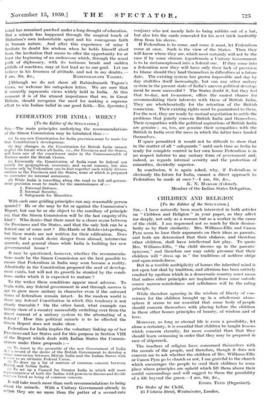FEDERATION FOR INDIA : WHEN?
[To the Editor of the SPECTATOR.] Sin,—The main principles underlying the recommendations of the Simon Conunission may be tabulated tlms —
(a) In any new Constitution for India provision must be made for that Constitution's development.
(b) Any changes in the Constitution for British India cannot neglect the future when all-India, i.e., the Provinces and the States, will form one of the constituent units in the Commonwealth of Nations under the British Crown.
(c) Eventually the Constitution of India must be federal not merely for geographical, economic, and racial reasons, but also because only by Federalism can be knit together such widely diverse entities as the Provinces and the States, none of which is prepared to surrender its internal autonomy.
(d) While India is travelling along the road to full self-govern- ment provision must be made for the maintainance of :— 1. External Defence.
2. Internal Security.
3. Safeguards for Minorities.
With such sane guiding principles can any reasonable person quarrel ? He or she may he for or against the Commission's Report, but can he or she object to the corollary of principle (a), that the Simon Commission will be the last enquiry of its kind ? Who denies that there must be a closer nexus between the Provinces and the States, and that the only link can be a federal one of some sort ? Die-Hards or Bolshevists perhaps, but these words are not written for their edification. Does anyone but a crank desire danger from abroad, internecine quarrels, and general chaos while India is building her new governmental house ?
It may be questioned, however, whether the recommenda- tions made by the Simon Commission are the best possible to ensure that Federalism in India may soon become a reality. Admittedly in the Constitution proposed the seed of develop. ment exists, but will not its growth be stunted by the condi- tions under which it is expected to mature ?
To the writer these conditions appear most adverse. To begin with, any federal government in and through success is apt to grow more unitary in character even if the outward forms of federalism remain intact. In the modern world is there any federal Constitution in which this tendency is not clearly traceable ? On the other hand, what example can history show of a country successfully switching over from the direct current of a unitary system to the alternating of a federal ? How this political miracle is to be effected the Simon Report does not make clear.
Federalism for India implies the voluntary linking up of her Provinces and her States and for this purpose in Section VIII of the. Report which deals with Indian States the Commis- sioners make three proposals :-
(a) To insert in the preamble of the new Government of India Act a record of the desire of the British Government to develop a eloser association between British India and the Indian States with a view to an ultimate Federal Union. (b) To draw up a list of matters of common concern between British and Indian India. lc) To set up a Council for Greater India in which will meet representatives of both the Indies with powers to discuss and decide matters listed as being of common concern.
It will take much more than such recommendations to bring about the miracle. With a Unitary Government already in action they are no more than the patter of a second-rate
conjurer who not merely fails to bring rabbits out of a hat, but also lets the cards concealed for his next trick inadroitly drop from his sleeve.
If Federalism is to come, and conic it must, let Federalism come at once. Such is the view of the States. Then they will know where they are, which most certainly will not be the case if by some obscure legerdemain a Unitary Government is to be metamorphosed into a federal one. If they come into a federation now they will have only their lack of prevision to blame should they land themselves in difficulties at a future date. The existing system has grown impossible and day by day stultifies itself increasingly, but can any other 'tory system in the present state of India's uneven political develop. ment be more successful ? The States doubt it, but they feel that to-day, not to-morrow, offers the easiest chance for accommodating their interests with those of British India. They are wholeheartedly for the retention of the British connexion. Their existing rights must be guaranteed to them. For the rest, they are ready by mutual negotiation to settle the problems that jointly concern British India and themselves. Their sympathies with the political aspirations of British India are genuine ; so, too, are genuine their sympathies with the British in India over the mess in which the latter have landed themselves.
If space permitted it would not be difficult to show that in the matter of all " safeguards " until such time as India be ready for complete control in her own house Federalism is in no respect inferior to any unitary form of government and, indeed, as regards internal security and the protection of minorities, decidedly superior.
In conclusion, it is again asked, why, if Federalism is obviously the future for India, cannot a direct approach to Federalism be made at once ?—I am, Sir, &c.,
K. N. HAKSAR (Colonel).
Member of the Indian States Delegation.








































 Previous page
Previous page